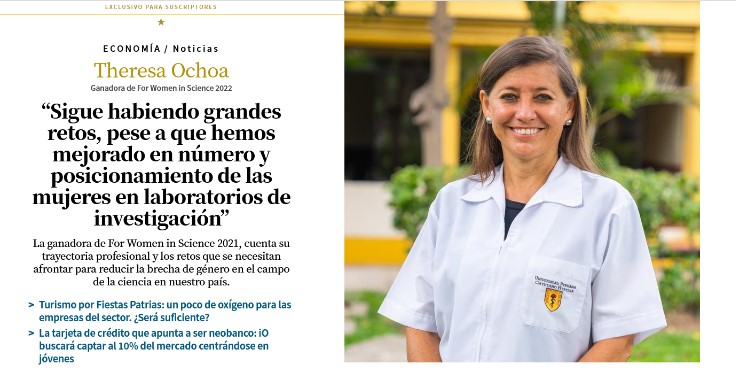DR. THERESA OCHOA: “IT IS IMPORTANT TO PROMOTE THE PRESENCE OF MORE WOMEN LEADERS IN SCIENCE AND RESEARCH MANAGEMENT.”

The promotion of meritocracy in science and technology is fundamental for the development of any country. Although there have been significant advances in the participation of women in scientific research, there are still challenges that need to be addressed to position more women scientists leading scientific research institutions and organizations. This is an issue that Dr. Theresa Ochoa knows very well, who feels privileged because in “Cayetano Heredia they have always been evaluated for their leadership and personal management skills”, especially highlighting the female professional of the institution.
Dr. Ochoa, director of the Alexander von Humboldt Institute of Tropical Medicine, a research center of the Universidad Peruana Cayetano Heredia, says: “I am very aware that in other universities and academic or research institutions there is still not that openness for the capacity that one has, regardless of being a woman or a man. We must recognize that there are still many differences.”
Dr. Ochoa mentions that when she began her degree program in medicine in 1989, twenty percent of her graduating class was made up of women. The same happened when she studied biology. However, today there has been significant progress that has reduced that gap, and now in these “degree programs fifty percent are women, even, in some cases, reaching perhaps sixty or seventy” percent.
The gender gap in education refers to the barriers that girls and women face in accessing quality science education. Education specialists believe that to increase the representation of women in science, it is essential to promote STEM (science, technology, engineering and mathematics) education among girls from an early age and to eliminate gender stereotypes in scientific degree programs. In this regard, Cayetano Heredia stands out for its commitment.
One of the examples to highlight, says Dr. Ochoa, is to mention Fabiola León Velarde, who was president of Concytec, and there have also been other centers led by women.
However, it is also recognized that what happens in the capital city is not always replicated in other regions of the country and that “perhaps it is not the same in the interior of the country or in public universities where there is not the same distribution of research positions or research managers”, she added. Overcoming these challenges requires active collaboration between governments, educational institutions, private companies, and society in general. The implementation of gender equality policies, mentoring programs, diversity and inclusion training, and raising awareness of the importance of diversity in science are important steps towards a future where women scientists lead institutions and research organizations in science in an equitable and fair manner.





